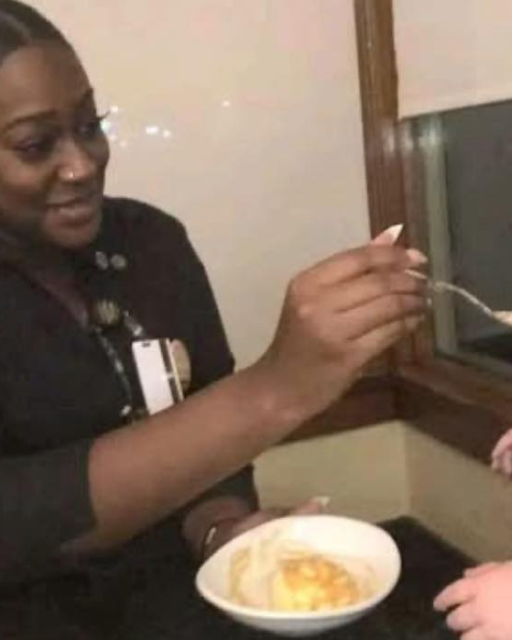We’d been at the hospital all day.
Not just that day, really. It had become days. Plural.
The kind of stretch where clocks stop meaning anything and time folds in on itself between beeping machines and quiet tears in hallways.
My three-year-old daughter had a fever that wouldn’t break, a stomach that wouldn’t settle, and a look in her eyes that terrified me more than the diagnosis.
She hadn’t eaten since the ambulance ride.
Not a bite.
Not the applesauce they brought on the little tray with the cartoon spoon.
Not the crackers shaped like animals.
Not even the mac and cheese—the kind she usually begged for and wore half of on her shirt.
“She’s just scared,” the nurse said gently. “This happens sometimes. We’ll try again later.”
But “later” had come and gone three times already.
She was shrinking.
Not just physically, but into herself.
Her tiny frame curled tighter. Her voice, once wild with curiosity, had gone quiet. Her hands clutched the stuffed bunny we brought from home like it was the only thing tethering her to the ground.
I sat in the vinyl chair by her bed, exhausted in a way I didn’t know I could be.
Then came the knock.
Soft. Almost unsure.
A woman I didn’t recognize stepped into the room. Mid-fifties maybe, in pressed black slacks and a dark sweater. Her name badge flashed silver, but I couldn’t read it fast enough.
She wasn’t part of the pediatric team. I’d memorized those faces by now.
She gave a small smile.
“Mind if I try?” she asked.
I hesitated.
It wasn’t a “no.”
But it wasn’t an immediate “yes” either.
I think it was the calm in her eyes that made me nod. That, and the way she spoke—like she wasn’t there to fix or rush or push. Just… be.
She walked over and sat in the chair across from my daughter. No clipboard. No stethoscope. No gloves.
Just her hands, folded in her lap, and a presence that felt strangely still.
She looked at my daughter, then pointed to the empty chair beside her bed.
“May I?”
My daughter blinked once.
No nod. No words.
But she didn’t say no either.
The woman reached over and gently picked up the untouched bowl of soup. Not hot anymore, but warm enough.
Then she started talking.
Not about food.
But about butterflies.
“How some butterflies,” she said, “are scared to land, even when they’re tired. They fly and fly and fly… and sometimes, they need someone to sit really still. Just to show them it’s okay to come down.”
She spoke softly, like telling a bedtime story.
“Sometimes,” she continued, “they don’t need to be caught. They just need to know someone’s waiting.”
My daughter was listening.
I could see it in the way her hand stopped rubbing the bunny’s ear.
The woman dipped the spoon into the soup.
And said, “This one’s for the blue butterfly. He’s brave today.”
She lifted it up.
And my daughter—who hadn’t eaten in nearly two days—opened her mouth.
Just like that.
No coaxing. No pleading.
Just trust.
Spoon by spoon, butterfly by butterfly, the bowl slowly emptied.
And I sat there, stunned. Holding back tears in the quietest way possible.
Because I didn’t want to break whatever magic this was.
When it was done, the woman smiled at my daughter, whispered “thank you,” and set the bowl aside.
Then she stood.
No fanfare. No lecture. No lingering.
Just a simple, “You’re doing great, sweetheart,” and a gentle nod to me.
She was gone before I could ask her name.
Later that evening, I asked one of the nurses about her.
They weren’t sure who I meant.
“Maybe someone from hospitality or spiritual care?” they offered. “They check in from time to time.”
But no one knew for sure.
And somehow, I didn’t need to.
Because now I knew what grace looked like.
It wasn’t dressed in angel wings.
It didn’t announce itself with trumpets or dramatic lighting.
It came in quietly.
Sat softly.
Spoke gently.
And made something sacred out of soup and stories.
My daughter started eating again that night.
Slowly at first.
But surely.
And within two days, she was sitting up in bed, asking for toast and juice and extra napkins to “tuck in Bunny.”
We went home three days later.
And while I never saw that woman again, I think of her often.
Especially on hard days, when I feel helpless or unsure or like I’m not enough.
I remember that some things—the best things—don’t come loudly.
They come with patience.
And kindness.
And the quiet understanding that sometimes, we’re all just butterflies.
Tired.
Afraid to land.
Looking for a safe place to rest.
If this story touched your heart, share it.
For the ones who show up quietly.
For the strangers who become anchors.
And for every child—and parent—who needed a gentle voice to remind them:
You’re not alone. 🦋🍲💛




